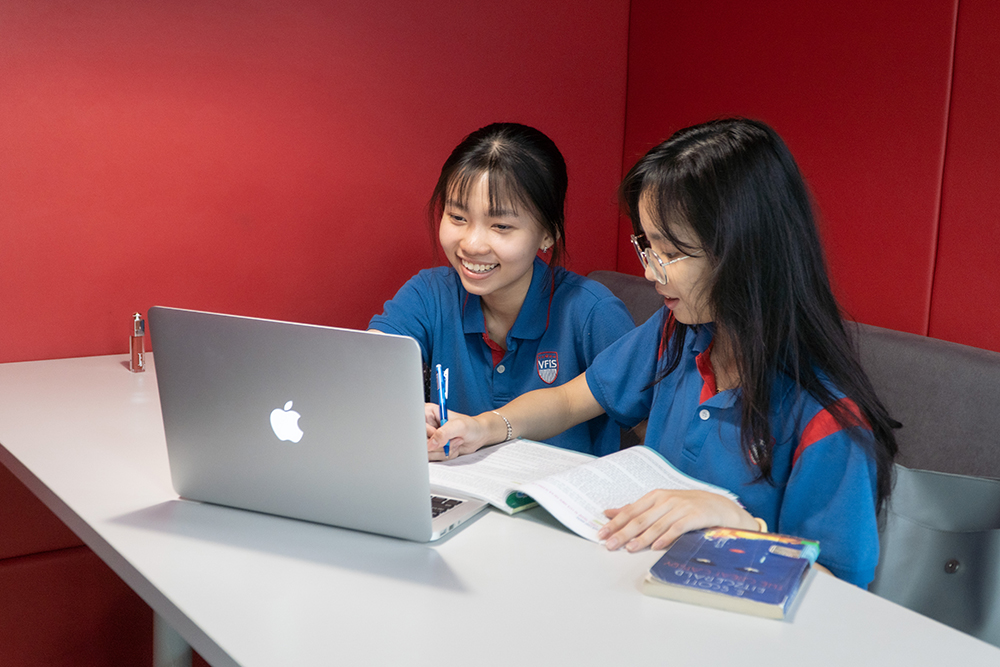Most students learn best by doing, not listening. The Finnish core curriculum sets the guidelines for instruction at VFIS, but it is the teachers who gather material, plan lessons and evaluate student progress. VFIS teachers work with the same group for a long time and get to know each student well. This allows the teacher to tailor lessons to make learning both effective and interesting. Our teachers also act as role models and support the growth of students’ self-esteem.
Finnish teachers all have a master’s degree in education and their in-service training is continuous. In their studies to become a teacher, they have learned the latest in pedagogical research and also conducted their own research in the field of education. This helps our teachers to evaluate their own teaching and develop best practices with fellow teachers. In addition to teaching, VFIS teachers engage in curriculum development, school assessment and development, special education, leadership and extracurricular activities.
In the classroom, teachers nurture individual growth and learning. Personality, morality, creativity, knowledge and skills are all valued equally, allowing our students to concentrate on learning rather than competition. Teachers use a variety of assessment methods and evaluate student progress every day. Students also learn to assess their own learning as well as that of their peers. The school does not rely on standardized testing as the main tool for assessment.
Individual Learning Plan
Each pupil has an Individual Learning Plan (ILP). The aim of the ILP is to enhance individual learning paths, to guarantee smooth progress in studies and to promote pupil’s well-being. The ILP supports each teacher in planning his/her work and the cooperation between teachers and parents. The ILP also provides information for parents and assists them in better supporting their child. The plan lays the foundation for assessing pupil’s progress.

Interdisciplinary learning
In Interdisciplinary learning, the systematic use of pedagogic methods is followed by all teachers. The implementation as well as the duration of integrative instruction and learning in Interdisciplinary learning may vary upon the needs of an individual pupil or a specific pupil group or class. Aligned with the objectives set for a specific learning entity, the instruction may include, for example:
- Parallel study, i.e. studying the same theme in two or more subjects simultaneously
- Sequencing, i.e. organising topics related to the same theme into a sequence
- Functional activities, including theme days, events, campaigns and study visits
- Interdisciplinary learning modules, which are planned and implemented in co-operation between several subjects and by several teachers
- Selected content from different subjects combined into integrated modules

In Interdisciplinary learning,students learn to take full responsibility for their learning, by contributing to their learning aims, way of collaboration, learning product and assessment. By this way, Interdisciplinary learning develops several skills of students including social communication, multi-literacy, creativity, learning, thinking, working, problem-solving skill and active participation, and especially, the skills in using digital devices and eLearning environments.
Intergrated technology curriculum
VFIS has a Digital Learning Path plan and integrates technology in all areas of the school. VFIS teachers and students decide the best possible use of technology at a given time. All students are guided in the correct, moral and ethical use of technology.
In VFIS, all classrooms are networked and have interactive technology. Wireless internet access allows students to research wherever they are on campus. Beside a wide range of modern technologies, students are able to use many useful applications to collaborate, communicate and create.

English as an Additional Language
With the English immersion approach, game bai đổi thưởng is committed to preparing students to be successful global citizens in any culture and to promoting cross-cultural understanding. We believe in our students learning progress regardless of their current English proficiency. The aim of English language and literature subject taught at game bai đổi thưởng is to develop students’ literacy skills, to help them develop their thinking skills and to nurture a love of English literature through reading for enjoyment. At the same time, our students are expected to respect other students’ culture while maintaining their own cultural identity.
Clip:
